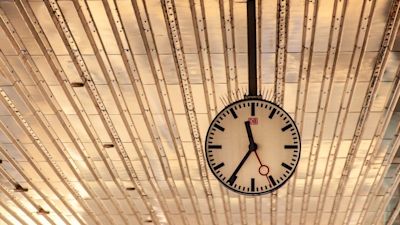Explainer
When and why do the clocks go back - and who invented daylight saving?

This Sunday will mark the arrival of winter in the UK, bringing darker days, a new time zone - and an extra hour of sleep.
The idea of daylight saving was first proposed more than 100 years ago. Ever since it was introduced, the nation has changed the clocks back every autumn.
Here’s everything you need to know about when and why the clocks will "fall back".
When will it happen?The clocks will go back by an hour at 2am on Sunday, October 27.
As the clocks change, so does our time zone. After spending the last few months in British Summer Time (BST), the UK will move into Greenwich Mean Time.
It is also known as moving from Daylight Saving Time to Daylight Standard Time.
Everyone will gain an hour of sleep when clocks go backwards, and we lose an hour when they move forward again in spring.Some people like to use the mnemonic "spring forward, fall back" to remember that clocks go forward an hour in spring and back in the autumn.
How does the clocks going back or forward affect you?
Changing the clocks will see an hour of sunlight moved from the evenings to the mornings, with sunrises and sunsets occurring an hour earlier.
From Sunday onwards, days will get shorter and darker in the build-up to the darkest day of the year - winter solstice.
Why do the clocks go back at the weekend?
The decision to change the clocks on a Saturday night and Sunday morning was made to minimise disruption to schools and businesses.
Subscribe free to our weekly newsletter for exclusive and original coverage from ITV News. Direct to your inbox every Friday morning.
Where did the idea of changing the clocks come from?There have been various proposals since the 18th century. But it was builder William Willett, the great-great-grandfather of Coldplay lead singer Chris Martin, who successfully campaigned in Britain to change the clocks.
In his pamphlet, The Waste of Daylight, he proposed clocks should be put forward by 80 minutes in four steps during April and reversed the same way during September.Thanks to his campaigning, British Summer Time was established in the 1916 Summer Time Act.
The act was brought into place during the First World War, when the country needed to make use of as much daylight as possible to conserve coal.
Why are some people against daylight saving?
Some have argued changing the clocks disrupts the natural rhythm of our sleep, which can cause health problems.
The lack of sunlight in the winter months can lead to potential vitamin D deficiency, and trigger mental health problems such as seasonal depression.
Experts have also warned changing the clocks can cause anxiety, upset stomachs and confusion for pets.
Want a quick and expert briefing on the biggest news stories? Listen to our latest podcasts to find out What You Need To know